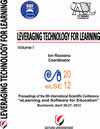LEARNING TASKS AND FEEDBACK IN COMPUTER-ASSISTED EDUCATIONAL SITUATIONS. NEW CHALLENGES FOR TEACHERS AS 21ST CENTURY PROFESSIONALS
LEARNING TASKS AND FEEDBACK IN COMPUTER-ASSISTED EDUCATIONAL SITUATIONS. NEW CHALLENGES FOR TEACHERS AS 21ST CENTURY PROFESSIONALS
Author(s): Simona Găbureanu, Irina VASILESCUSubject(s): Education
Published by: Carol I National Defence University Publishing House
Keywords: Language learning; learning task; feed-back
Summary/Abstract: Today, the professional in the education system is proactive, open to innovation, anchored in the technological, pedagogical and academic actualities, available to collaborating and sharing with colleagues. New environments, tools and ideas are emerging from enhanced and open education practices, and a series of new skills, both pedagogical and technological, are constantly brought upfront as a key enabler or integrator for the assembly of the new roles and tasks of today’s education practitioner. The paper approaches the changes of the technological and pedagogical frameworks, focusing on two basic elements of education practice: the learning task and the feedback, in the light of a computer-assisted language learning situation. The focus is on specific computer-assisted language learning situations and learning materials that aim at fostering the development of language in use. Communication skills in different communication contexts are developed through practice, rather than considering language as a formal system of signs and rules. The use of language in real communicative situations should be the main goal of the second language learning, a more valuable goal than the ability to decode the language spontaneously. In this respect, the paper aims to present technological and pedagogical aspects concerning Computer Assisted Language Learning (CALL) and Intelligent Computer Assisted Language Learning (ICALL), in order to help teachers to better seize the opportunities offered by technology-enhanced learning systems. The added value of the use of technology in language learning depends on teachers’ abilities to create appropriate learning materials and to integrate them in the second language class.
Journal: Conference proceedings of »eLearning and Software for Education« (eLSE)
- Issue Year: 8/2012
- Issue No: 01
- Page Range: 157-160
- Page Count: 4
- Language: English

